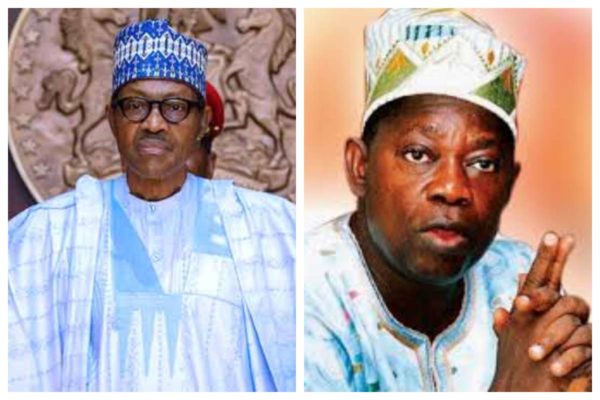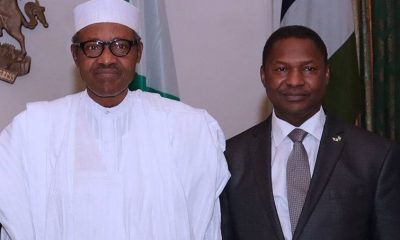Politics
Buhari’s Award Of GCFR To Abiola ‘Illegal’ – Ex-CJN Belgore

The award of Nigeria’s highest national honour to late Moshood Abiola is illegal, a former Chief Justice of Nigeria, Alfa Belgore, has told PREMIUM TIMES.
But other lawyers hold divergent views about the take of the retired top jurist in separate interviews.
President Muhammadu Buhari on Wednesday evening named Mr Abiola, winner of 1993 presidential election that was annulled by former dictator Ibrahim Babangida, a holder of the Grand Commander of the Federal Republic, GCFR, 20 years after his death in 1998.
Gani Fawehinmi, a rights advocate and icon of the June 12 struggle, was also posthumously honoured with the Grand Commander of Nigeria (GCON) by Mr Buhari. Mr Fahinmi died in 2009 at 71.
Mr Belgore, CJN from 2006 to 2007, said the national honours could not be awarded posthumously, much less the GCFR, which is the highest honour in the land.
“It is not done,” Mr Belgore told PREMIUM TIMES by telephone Wednesday night. “It is for people living.”
“The only thing they could do is to name a place after him, but national honours award, no,” he added.
Mr Belgore, who was chairman of the 2016 national honours committee, also said he “was not consulted” by the Buhari administration before the decision was taken.
Mr Belgore said under the 1964 National Honours Act, only soldiers or other servicemen could be awarded posthumous medals for their bravery.
The president also declared that Democracy Day would be celebrated on June 12 to further honour the memory of Mr Abiola.
The move has received mixed feelings, with supporters of the government seeing it as a welcomed move while critics dismissed it as a desperate political calculation ahead of 2019 elections in which Mr Buhari has declared he would run for second term.
Evidently, the National Honours Act (PDF), is silent on whether or not the national honours could be bestowed on a deceased citizen of Nigeria.
While the law said a fallen member of the armed forces could be posthumously awarded a medal for “pre-eminent act of valour or self-sacrifice in the presence of the enemy, or for devotion to duty in the presence of the enemy,” it was silent on the national honours, which are civilian honours different from medals.
The relevant section of the law stated the requirements for awarding national honours to a Nigerian as follows:
(I) The President shall by notice in the Federal Gazette signify his intention of appointing a person to a particular rank of an Order.
(2) Subject to the next following paragraph of this article, a person shall be appointed to a particular rank of an Order when he receives from the President in person, at an investiture held for the purpose-
(a) the insignia appropriate for that rank; and
(b) an instrument under the hand of the President and the public seal of the Federation declaring him to be appointed to that rank.
(3) If in the case of any person it appears to the President expedient to dispense with the requirements of paragraph (2) of this article, he may direct that that person shall be appointed to the rank in question in such a manner as may be specified in the direction.
This apparent legal vacuum created by the silence of these relevant sections on the eligibility or otherwise of a deceased has thrown Mr Buhari’s action up for individual opinions of legal experts.
Liborous Oshoma, a legal analyst and public commentator said even though the law is silent on whether or not the honours could be awarded posthumously, the sub-section three that said said the president could exercise discretion by awarding it to someone who is not president has rendered his action valid.
“A section said the person receiving the award must be present, then the following section said the president may confer the honour on someone even if the person is not president, as long as the president deemed the awardee appropriate for such honour,” Mr Oshoma said. “That suffices in my opinion.”
Mr Oshoma, a Lagos-based lawyer, also welcomed the development, describing it as long overdue.
Another lawyer from Lagos, Lilian Eronini, disagreed, saying the president flouted the law in conferring national honours posthumously.
“Even though it is important to honour the memory of Mr Abiola, the way the president went about it is illegal,” Mrs Eronini told PREMIUM TIMES by telephone Thursday morning. “Of course, we know the president did this to get votes from the Southwest people who are very passionate about June 12.”
“But there are so many problems going on in the country, and it seemed the president colluded with Lai Mohammed to distract Nigerians with this controversy,” she added. “They should respond to the resolutions passed by the National Assembly against the transgressions of their government, they should not sweep that under the carpet.”
But Abdul Mahmud, a lawyer in Abuja, hailed Mr Buhari’s decision, saying it was absolutely legal because the National Honours Act gave the president discretionary powers to honour the dead.
“The position of the former CJN Alfa Belgore is wrong,” Mr Mahmud said. “And his assertion is incorrect.’
Mr Mahmud said when former President Goodluck Jonathan failed to honour Stella Adadevoh, the late Nigerian doctor whose bravery helped curb Ebola virus from spreading in Nigeria, posthumously with national honours, he condemned it at the time.
“The decision of Mr Jonathan was wrong and unpatriotic,” Mr Mahmud said. “The law is clear that the president may choose to honour anyone even when they’re not present.”
Also weighing in on the dispute was Chris Uche, who said Mr Buhari stretched the aspect of the law that allowed a president to give national honours to individuals in their absence.
“The section is not flexible enough to accommodate posthumous award on the dead,” Mr Uche, a senior Nigerian lawyer, told PREMIUM TIMES by telephone Thursday morning. “It would be stretching the law to say because someone who is not present could be awarded then it means a dead person could be awarded, it was more about a person who is alive but unable to make it to the ceremony.”
Mr Uche said he recognised the “nobility of Mr Buhari’s intention” towards Mr Abiola and Mr Fawehinmi, but said it must be done “within the confines of the law.”
“Although the timing appears political,” he added.
(PREMIUM TIMES)












Ngorom
June 8, 2018 at 4:17 pm
Apparently, Buhari does not know the difference between a military dictatorship and a democratic insitution.